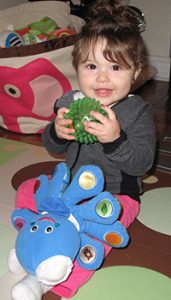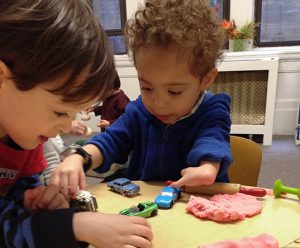 Early intervention programs for children with disabilities are required under federal law. But the quality of these programs has dwindled in recent years as a result of funding cuts. In 2012, Bank Street lost its toddler-parent playgroups, which fostered two crucial components of early intervention—support for parents, and developmental growth and interaction for children.
Early intervention programs for children with disabilities are required under federal law. But the quality of these programs has dwindled in recent years as a result of funding cuts. In 2012, Bank Street lost its toddler-parent playgroups, which fostered two crucial components of early intervention—support for parents, and developmental growth and interaction for children.
Recognizing the urgent need for these playgroups in our community, Bank Street alumni Sarah Piel, Gabrielle (Gabby) Felman, and Murray Kelley committed to running the playgroups on a volunteer basis, unrelenting in their efforts to keep the playgroups alive.
When they restored the program in 2014, what started out as one playgroup turned into two, and demand has continued to increase. These “Developmental Variations” playgroups are held at the Bank Street Family Center once a week, in which toddlers (ages 12 – 36 months) learn through play in an environment that is designed around each of their developmental stages. At the same time, parents participate in a support group, where they can offer guidance, empathize with each other, and learn through shared experiences.
“Parents of children with special needs often have a hard time finding other parents in similar situations,” Sarah said. “We empower them to help each other problem-solve.”
Parents in these circumstances often feel alone and lack any validation that they are supporting their children’s development in appropriate ways. But in the playgroups, they become part of a close-knit community with other parents who can identify with their experiences.
Reflecting recently on how the playgroups taught her to celebrate the strides her son has been making, one parent said,
“It is incredibly refreshing to be in a situation where the questions and focus are not about where my son is delayed or what is wrong with him, but rather a focus on watching him explore new things and an excitement for where he shows progress in small and big ways.”
The three alums contribute to the sessions in different ways. Sarah, who has an MSEd from Bank Street, is the special education teacher in the groups. Gabby and Murray, who both have an MSEd from Bank Street and as MSW from Columbia University, are social workers. Gabby leads the parent support group.
One parent is thankful not only for the support of other parents but also for Gabby’s clinical perspective on her daughter’s development.
“The information I receive while in the parent’s hour has been invaluable,” she said. “Having other parents to share stories and thoughts with, and a knowledgeable person to give insight from a professional standpoint has been extraordinary. I’m so glad to have access to these amazing families and professionals.”
Reflective of the qualities Sarah and Gabby learned at Bank Street, the groups center on social and emotional development with a focus on the “whole child,” including his or her family dynamic, home environment, early intervention schedule, etc. Children play and discover through a combination of activities. “Open-ended” activities might include dramatic play, sensory play, art activities, or manipulatives (blocks, stacking cups, magnets, books). “Close-ended” activities might include puzzles or pop-up toys. The groups also explore the relationship between the parent and child. When the parents leave their children to partake in their support group, they practice “separation and reunion.”
“You can’t treat a young child if you don’t treat the relationship,” Gabby said. “They don’t exist by themselves. By making the relationship a focus, we can ensure a more positive outcome for the children we work with.”
 The Family Center is also an approved fieldwork site for Bank Street graduate students, and where both Sarah and Gabby completed theirs. These days, there are fewer and fewer early intervention settings where students can get quality fieldwork, as it’s typical now for children to receive services in their homes. The playgroups provide a meaningful experience that supports the learning and growth of infancy and special education graduate students.
The Family Center is also an approved fieldwork site for Bank Street graduate students, and where both Sarah and Gabby completed theirs. These days, there are fewer and fewer early intervention settings where students can get quality fieldwork, as it’s typical now for children to receive services in their homes. The playgroups provide a meaningful experience that supports the learning and growth of infancy and special education graduate students.
Sarah, Gabby, and Murray have a confident vision for the future with concrete plans. This September, they’re hitting the ground running—in addition to leading the two current Developmental Variations playgroups, they are collaborating with the Family Justice Center to offer a playgroup for mothers with young children, which that organization serves. A fifth group, Parents and Me!, will also be offered for parents and babies ages 12 weeks to 12 months, where parents can discuss various themes of early development and parenting and explore an array of developmentally-appropriate activities and materials for their children.
“We want to redefine early intervention to include people who need extra support, as opposed to just those with biological developmental needs,” Sarah said. “Factors like poverty and trauma can also create a family who has special needs. We ask ourselves how we can fit into a much more widespread community—I hope this is just the birth of something.”